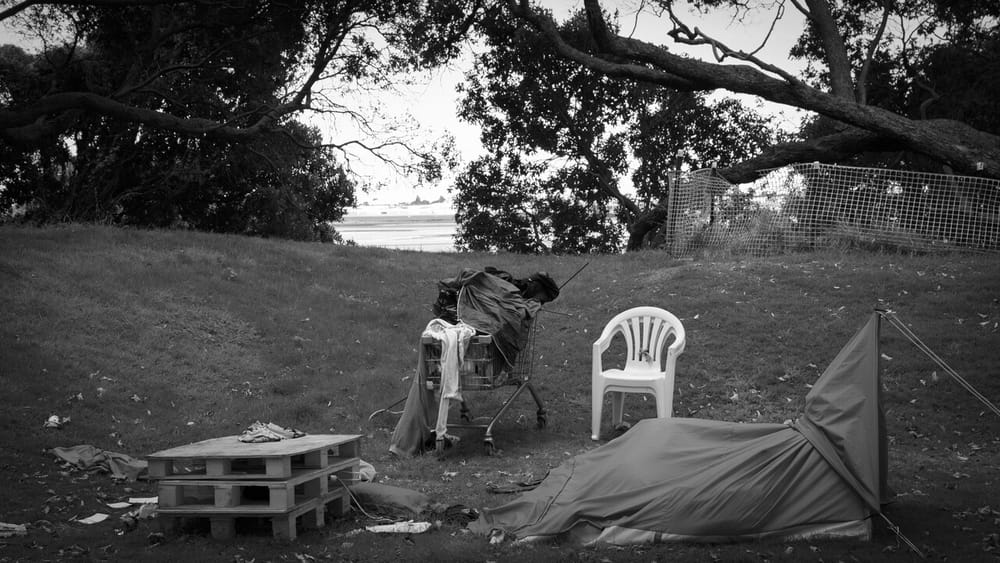
Why do wealthy Anglosphere countries have such poor mental health statistics? The Lovepost’s Capitalism and Mental Health series investigates this wealth-health paradox—and imagines doing things differently. Part 1 examines how neoliberal capitalism led to, and continues to have, devastating impacts on mental health, especially in high-income Anglosphere societies. Part 2 turns inward to highlight the internalised baggage of capitalism. How did unhealthy beliefs and values come to feel so normal?
It is patently absurd to imagine that the quarter of the population who have been diagnosed with a mental illness, or the fifth who take antidepressants, have an as-yet unidentified brain disease. Instead, this situation reflects the changing structure of contemporary capitalism.— Dr Joanna Moncrieff, psychiatrist and University College London professor
Some form of neoliberal or ‘gloves-off’ capitalism is the dominant political and economic structure in many high-income societies, yet its precise meaning is illusive and blurry. Few contemporary economists or governments describe themselves as neoliberal. There is also a disjunct between neoliberalism as a set of economic policies and its implementation in different democratic societies.
For the purpose of this series, neoliberalism describes an unprecedented social, political and economic reform which mandated that free market principles should run and manage society. From its opportunistic enactment in the 1970s, it now accounts for the globally dominant politico-economic system.
In his influential book, A Brief History of Neoliberalism, distinguished professor David Harvey defines neoliberalism as a political and economic theory which asserts that human wellbeing will be achieved by liberating individual entrepreneurial drive and capabilities. To give those propensities free rein, neoliberal market fundamentalism proposes to liberate and deregulate the market. It promotes trade at the expense of social protections, economic autonomy, and government spending on social welfare and public services.
Neoliberalism quietly recasts human nature as individual self-interest. Its economic project prioritises personal property, private capital ownership and protection, and each individual’s right to engage in the market economy without obstruction. Neoliberals decry the influence of non-business interest groups such as unions and environmentalists, insisting that individuals will achieve greater prosperity through their own hard work, free choice and rationality. And everyone will enjoy cheaper goods and services without government interference.
In just a few decades, the neoliberal influence has become a genetic imprint: states now assume neoliberal economics. That limits the possibilities of left and right politics. Democracy has become a vote about how to best serve people under capitalism. As a complementary ideological chorus, The World Bank and the International Monetary Fund promote and entrench neoliberal economics. Other bodies such as the World Health Organisation (WHO) normalise neoliberal economic practice.
As a result, neoliberalism no longer needs to be taught, lobbied for or celebrated. Professor Jamie Peck coined the term ‘zombie neoliberalism’ to explain how people unconsciously spread ideology through their decisions. They apply a neoliberal lens to problem-solving because neoliberalism is assumed to be the natural, default way to improve things. Contemporary policy challenges, such as environmental pollution regulation, are often framed within neoliberal understandings. This naturalisation makes it more difficult to grasp a systemic analysis, such as The Lovepost’s analysis of the effect of capitalism on mental health. Capitalism is just normal life, isn’t it?
Capitalism is pervasive, yet its negative mental health impacts are worse in English-speaking countries. To understand this distinction, the fiercely liberal capitalism of the 'Five Eyes' Anglosphere (the United Kingdom, the United States, Canada, Australia, and New Zealand) is usefully compared with the more muted and coordinated neoliberal capitalism that has been implemented in countries such as Germany, Denmark and Norway.
The clinical psychologist Oliver James investigated why Anglosphere countries have rates of mental distress two times the levels of their capitalist cousins in Europe. He named his book after the anglophone capitalist: The Selfish Capitalist: Origins of Affluenza. Selfish capitalists champion individual self-interest over collective welfare and prosperity, and James proposed that the more forceful Anglosphere reforms increased socioeconomic adversity for many people.
James’ book was published in 2008. Many analyses continue to find that wealthy English-speaking countries have the highest levels of reported mental distress worldwide including rates of anxiety, depression and substance abuse.
The neoliberal 1970s: a triumph of opportunism
The Anglosphere wasn’t always so selfish. Neoliberal theory was sketched out in 1938 by a group of European thinkers including Friedrich von Hayek and Ludwig von Mises. Their ideas had marginal influence until they established the Mont Peleren Society in 1947. The Mont Peleren Society attracted international members including Milton Friedman, a newly minted American economist who would become a central ideologue in his role as an advisor to US president Ronald Reagan.
After World War II, most Western governments believed that the state's role was to balance its interest in economic growth and competition with its responsibility for citizens' welfare. States sought to reduce the more damaging effects of the market and secure well-paid employment, access to health care, free education, employment and social pensions so that their citizens could maintain a prosperous and healthy life. Postwar capitalism fostered major increases in the standard of living for an expanding, predominantly White, middle class in anglophone countries.
Petroleum shortages flattened economic growth in the 1970s. Inflation and unemployment soared simultaneously. Government spending ballooned just as tax revenues dropped. Social unrest became acute with mass strikes over unsustainable work conditions and pay, particularly in the United Kingdom.
Governments sought radical economic remedies for the downturn. Neoliberal think tanks and university economics departments—notably the University of Chicago, where Friedman eventually settled—insisted that the downturn would be reversed by removing state control over the marketplace. By the mid-1970s, neoliberal economic policies had gained traction and influence. Highlighting neoliberalism’s new esteem, Friedman won the Nobel Prize for Economics in 1976, two years after von Hayek won the same award
By the late 1970s and early 1980s, UK prime minister Margaret Thatcher and US president Ronald Reagan were experimenting with neoliberalising markets and public institutions in their respective countries. Despite ostensibly different political leanings, the Labour Parties of Australia and New Zealand quickly followed suit. (While this series focuses on the Anglosphere experience; driven in good part by international institutions, neoliberal reforms also caused massive disruption and hardship wherever they were adopted.)
It's worth pausing to reflect on the profound societal changes these reforms set in motion. The social effects of cutting subsidies, opening domestic markets to international competition, and rapidly transferring jobs and manufacturing plants offshore were cataclysmic for many communities. The job losses in some areas were reminiscent of the staggering unemployment rates of the Great Depression.
The broken windows of abandoned factories were mirrored in the broken windows of abandoned homes. Mass blue-collar job losses had profound downstream effects on communities, as lack of employment caused chronic social disruption and reduced living standards for workers, their families and communities. Urban and community decay followed as did family violence, crime, alcohol and drug addiction, adolescent delinquency, a loss of trust in social institutions and reduced investment in community infrastructure.
Neoliberal politicians framed this as a kind of 'creative destruction'—a necessary and inevitable process. To deflect criticism of the social devastation caused by their actions, Thatcher and her Anglosphere doppelgängers attached moral blame for unemployment to the attitudes of the workers themselves and the pesky influence of anti-growth trade unions. Corporations blamed employees' living wage demands for their relocation of production to unregulated countries where people were ‘willing’ to work for less.
The neoliberal state and its new social contract
Anglophone citizens awoke to a new social contract with governments whose priorities were markets, capital, and property rights. Within each country, political influence shifted to those with financial interests in the market: private property owners, businesses and multinational corporations. Corporate interests were able to influence social policy directions, even as wealth insulated business leaders from the impacts of those policies. Social prosperity, business leaders asserted, would follow from a permissive business environment. The benefits of their own success would ‘trickle down’ to benefit everyone.
Under neoliberal guidance, governments hollowed out their own capacity and autonomy to shore up the floor of their citizens' basic entitlements. Society became a more hostile place for anyone who was not financially secure. Charities and local community groups were expected to manage the consequences.
To a greater degree in the Anglosphere than in other European countries, social spheres were also marketised, although they had previously been considered beyond the market’s scope or relevance. Public education, social security and health care were reformed, while core state assets and utilities were privatised. The remaining public institutions were expected to run as businesses, applying neoliberalism's organisational approach to 'new public management'. Target-focused working culture, hierarchical organisational models, cut-throat accountability, intensive data collection and increased surveillance characterised the public sector’s new, competitive market culture
A hard-headed cost-benefit analysis was incorporated into the new oversight of public health care and education. Two-tiered systems emerged: people with money paid for and received more and better care, while those who could not pay received what was offered. The unconditional right to access became a conditional right to purchase services. Even the language changed. Citizens became consumers, students became education service users and distressed families became clients.
Neoliberalism is thus much more than a market theory. It is the market's redefinition of society, based on a market-serving concept of human nature and rights.
Neoliberalism increases inequality. Mental illness follows in lockstep.
How are Anglosphere capitalist societies making people mentally unwell? To answer this question, The Lovepost consulted two mental health professionals who link rising rates of distress to the neoliberal environment on either side of the Atlantic Ocean. Dr Joanna Moncrieff is a psychiatrist and professor at University College London, and Dr Anna Zeira is the chief psychiatry resident at the University of Maryland. They each place social, economic and political determinants at the causal centre of our mental health crisis. Their perspectives give voice to the frontline physicians and health professionals who often treat—but feel unequipped to help—people wounded by the social and economic consequences of modern life.
“The fact that there is so much variability in rates of depression and anxiety across different periods of time and cultures makes me think that there must be several environmental factors at play—[factors] that are not being addressed,” Zeira says.
In a 2022 article, Zeira concluded that policies intrinsic to neoliberal capitalism have driven the worsening American rates of “mental illness, life expectancy, infant mortality, obesity, children’s educational performance, teenage births, homicides, imprisonment rates, and social mobility.” She points to the neoliberal malaise of rising income inequality as the specific force driving this negative trajectory.
The WHO backs up Zeira’s intuition about systemic causes. It finds that many common mental disorders—particularly depression and anxiety—are "to a great extent, shaped by the social, economic and physical environments in which people live." The WHO also surmises that income inequality is a crucial, causal component of the prevalence of mental distress in the United States and other unequal societies. Even the International Monetary Fund now acknowledges the adverse social effects of income inequality.
To draw out capitalism’s effects on mental health, it is important to highlight that income inequality is a natural and integral outcome of capitalism. Neoliberal capitalism has made this process more pronounced. Neoliberalism has overseen and fostered a dramatic redistribution of wealth, impoverishing and inducing chronic socioeconomic insecurity for many while drawing greater wealth towards the top percentiles of the Anglosphere population. The data exposing this redistribution are clear and uncontested. To cite just one example: since the end of the 1970s, 50 trillion USD has been transferred from the bottom 90 percent of American households to the top 10 percent.
The WHO report calls economic inequality an overt health risk factor, with "the poor and disadvantaged suffer[ing] disproportionately from common mental disorders and their adverse consequences."
To ground her analysis, Zeira turns to a much-lauded study for the British Journal of Psychiatry by professors Richard Wilkinson and Kate Pickett. Their study reports an internationally consistent link between income inequality and mental health issues: the greater the income inequality within a society, the higher the prevalence of mental illness, drug dependence and abuse. The startling rise of inequality in the Anglosphere—particularly the United States—since the 1980s, compelled some of the study’s strongest associations with mental illness.
Pickett and Wilkinson went on to demonstrate that income inequality doesn’t only affect those at the bottom of any country’s social hierarchy. It impacts the mental health of all members of society because inequality also leads to weakened social relationships and correlates with less trust, more aggression and crime, and less community engagement. All of these factors increase distress throughout society.
Zeria incorporates Pickett and Wilkinson’s research into her analysis. She argues that vulnerable people have been hit with two simultaneous blows. Deregulation of the market and the workplace have produced job and income precarity, while welfare reform has made support much more difficult to access. These dual hardships breed distress.
In chapter 12 of Liberatory Psychiatry: Philosophy, Politics and Mental Health Moncrieff writes from a similar perspective:
Neoliberal policies . . . entail the polarization of wealth, power, opportunity, and life experience. They have enriched the already wealthy, empowered multinational corporations and impoverished a significant proportion of the population.
A 2010 report from the UK Royal College of Psychiatrists agrees. ”Higher income inequality is linked to higher rates of mental illness, decreased rates of trust and social interaction and increased hostility, violence and racism, as well as lower wellbeing scores.”
Moncrieff's research and books, including A Myth of the Chemical Cure: A Critique of Psychiatric Drug Treatment, explore how socioeconomic problems exacerbate suffering. Such suffering is increasingly medicalised as mental disorders, leading to misdirected and ineffective mental health care treatments.
The neoliberal workplace and its health implications
As Zeira observes, many adults experience neoliberalism personally by spending their days in deregulated workplaces. Workplaces and labour markets are thus locations to understand the harmful impacts of neoliberal reforms.
Research has found that many modern work environments and employment prospects have become literally toxic to wellbeing: “Precarious, unstable, insecure forms of living” are the boom and bust cycles of global capitalism. Rapid and unpredictable economic crashes (with the associated job losses and financial instability) ignite rates of severe depression, anxiety, violent behaviour and risk of suicide.
A UN report on mental illness supports these findings:
One of the most serious economic threats to mental well-being stems from repeated financial shocks, such as income loss. Economic insecurity—or just the perception of such insecurity, even if transitory—is a major factor in mental distress.
Zeira and Moncrieff believe that workplaces have been made unhealthy by the combination of wider socioeconomic instability and neoliberal reforms which curtailed workers’ rights. Research finds a “strong, consistent and negative relationship” between neoliberalism and deteriorating worker rights and protections: workers now have far fewer rights, less-secure positions and limited career progression. They also work with a greater risk of exploitation. Many neoliberal employees are juggling increasing workloads, little autonomy, competition with other employees, longer work hours, and intensive surveillance and management. Such environments result in epidemic levels of distress, exhaustion and disengagement.
Rather than feeling freer and better off, neoliberal workplace reforms have left most people feeling that they have less control over their lives, and greater fear of the external influences which determine their wellbeing. An ever-larger segment of the anglophone population lives in a state of stress and pressure, nervous about their economic security and concerned that there is little that can be done to change the situation.
Psychiatrists have found that working in these stressful settings predicts future mental disorder diagnoses. A meta-analysis of 228 US studies linked modern workplace stressors and job precarity in the United States to an excess of 120,000 deaths per year.
Gloves-off capitalism has also introduced the gig economy—the ultimate form of neoliberal industrial relations. As of 2021, nearly a fifth of the working population in the United States engaged in gig work. 'Precariat' working conditions constitute psychosocial risk factors for stress, apathy, anxiety and depression. A Canadian study found that gig workers experience higher psychological stress from economic insecurity than salaried, waged or traditional self-employed workers.
Across today’s high-stress labour market, Moncrieff writes that an increasing number of modern workers face insecurity and intensive performance expectations, without social protections or benefits. “Outsourced labour and increasingly popular gig work do not provide workers with the stability, social cohesion, and meaning that were once provided by direct employment by companies and manufacturing jobs.”
In each of their countries, Moncrieff and Zeira observe that economically driven distress clusters at the lower end of the socioeconomic hierarchy. Poorer households are at greater risk of mental distress. They may live with a combination of material disadvantage, housing instability, low income, worsening education outcomes, debt entrapment, higher risks of violence, unemployment, underemployment and social exclusion. Economically induced family stress has serious, lifelong consequences for all family members, especially children.
In her career, Moncrieff sees the stresses of perpetual economic insecurity routinely being medicalised as mental illness. She told The Lovepost: "I've worked in services that, in the UK, accept referrals from general practitioners under the National Health Service, which the vast majority of the population uses. And overwhelmingly, they are people from lower social classes who are struggling with multiple social problems that would make anyone depressed or most people depressed. We are undoubtedly medicalising social problems."
To say that economically induced distress weighs most heavily on the impoverished is not, however, to say that it affects only a few. Poverty and its attendant social and psychological issues are becoming more pervasive in Australia, the United States, New Zealand and the United Kingdom. Traditional service professions such as teaching, nursing, policing, and firefighting rarely pay enough to meet urban living expenses. Since the 1980s, living costs have consistently increased while wages have flatlined, meaning that a median male American worker is now paid much less in real (inflation-adjusted) terms than they were in the 1970s.
As one response to workers’ wage stagnation, neoliberal governments deregulated credit and normalised debt to preserve the impression of growth—although the adverse mental health consequences of problem debt are well established. The introduction of ‘let them eat credit’ policies pushed many people into long-term debt entrapment.
As with neoliberal changes to national social contracts, it’s important to recall that the workplace trends above represent an abrupt break with longstanding Anglosphere expectations. Generations of people have worked hard to get ahead. However, Zeira emphasises that neoliberal reforms have not led to the social class mobility that workers had grown up expecting to enjoy. Unlike their parents' or grandparents' generations; hard work, education and employment no longer ensure social mobility for the ‘avocado on toast’ generations. Prohibitive house prices further entrench inequality through intergenerational wealth transfers. An expectation gap has opened, as people ”substantially overestimate” their ability to raise their financial standing through hard work and innate ability.
That is new and harmful. When expectations falter and lead to self-blame and anxiety, people bring their distress to a health system which averts its eyes from systemic causes of their experience.
Moncrieff writes:
It is for the real losers of neoliberalism that the medicalisation of discontent is most significant and most prevalent. Rising inequality, falling social mobility and the public parade of wealth presented by the media’s obsession with celebrity mean that expectations are pushed up at the same time as the chance of achieving relative social progress falls. This gives rise to a widening gulf between expectations and reality.
Who deserves our social concern?
The research clearly shows that the Anglosphere’s gloves-off capitalism necessarily expands inequality and structures insecurity into more and more lives. Moncrieff and Zeira reason that this insecurity profoundly aggravates distress. Neoliberalism further declares its value judgements on the people most affected by its hardship.
Neoliberalism narrowed access to social support and made long-term cuts to education, health care and other social services. In each country, change was rationalised partly by suggesting that some groups in society were beyond help. Selfish capitalist ideologies framed the ‘undeserving poor’ as idle dependents, unwilling to work and happy to exploit everyone else. Zeira identifies them bluntly. “This disposable group has historically been the poor and segregated people of colour, left vulnerable by de-industrialisation and [the] reduction of social services, leading to chronic stress.”
In each country, sloganistic catchphrases made the harm more palatable. British prime minister Margaret Thatcher targeted the “incubus” of welfare dependency. American presidents Ronald Reagan and Bill Clinton spoke of “welfare queens”, a racial trope of a Black single mother. Australia and New Zealand likewise introduced reforms to make life harder for the “dole bludgers”. Governments gave their societies increasing permission to blame and condemn anyone who needed help: “they” were ruining things for “all of us”.
Neoliberal governments claimed that welfare assistance was infantilising. Poor people required tough love and re-education in order to become personally responsible, less antisocial, less culturally divergent, market-compliant actors. Once reformed, they would become motivated to work any job regardless of pay, conditions or location.
Zeira recounts that across the Anglosphere, unemployment support was made more difficult and more conditional. The increased policing and surveillance welfare recipients only increased extreme poverty. For the unemployed, these changes significantly increased severe psychological distress. They are directly linked to suicides.
Unemployment was also unintentionally pathologised by the withdrawal of welfare support. Many unemployed people sought to reclassify themselves as mentally unwell in order to continue receiving payments. In the first four years of US president Clinton’s unemployment reform, Zeira cites research that the number of people—particularly young people—who received social security income for psychiatric conditions doubled.
In the United Kingdom, Moncrieff summarises that "the only way of being excused from work in modern society is to be sick or to be old. Otherwise, you're going to be forced into work. So we give people an incentive—particularly people whose alternative is crappy-paid, zero-hour contracts that are actually going to make getting by really difficult—to be sick."
Moncrieff's own research suggests that shifting stressed people from unemployment to illness-related benefits paid political rewards by allowing governments to depoliticise and disguise real unemployment rates and social issues. Low unemployment could then be cited as evidence of national economic success.
Moncrieff and Zeira also observe that neoliberal states simultaneously heightened their disciplinary regimes to manage struggling populations. In the guise of law and order, financially insecure and socially marginalised people have been increasingly redirected and processed through the criminal justice system. For Moncrieff, increasing authoritarianism reflects “attempts to police the consequences of economic policies by controlling and excluding the minority of Western populations that are the victims of the dismantling of the welfare state and the low-wage economy.’’
Their perspective is supported by University of California-Berkeley professor Loïc Wacquant. In Punishing the Poor: The Neoliberal Government of Social Insecurity, Wacquant asserts that the growth of incarceration levels has been a structural feature across neoliberal capitalist societies.
Consistent with these assertions, the Anglosphere has higher per capita imprisonment rates than its European colleagues. Since the 1980s, incarceration rates have grown by 500 percent in the United States. New Zealand’s incarceration rates are the second-highest among high-income countries.
Compounding colonial and racial impacts
In communities and in courtrooms, Zeira sees the compounding impacts of neoliberal policies on minority communities: "Minority populations are disproportionately subject to police violence and incarceration. They are three times more likely to be incarcerated than Whites for the same offence in the US. They also have decreased investment in their communities, leading to poor infrastructure—which is all justified by neoliberal ideology and racism."
Zeira illustrates the socioeconomic and emotional distress that such high rates cause for prisoners, their families and their communities. She suggests that it is a likely causal factor in the alarming increase in deaths by suicide among young Black men.
Neoliberal reforms also coincided with a sharp climb in mental health problems and risk of suicide for Indigenous populations in New Zealand, Australia and the United States. Neoliberal ideology attributes the disparities in health and wellbeing to self-limiting attitudes within Indigenous communities.
Zeira objects to this blinkered, detrimental analysis. Market transactions may be deracialised, but their social preconditions are not: "[T]he neoliberal assumption that the market can provide for everyone who wishes to work does not take into account the history of economic disadvantages [which] minority populations have suffered, due to decades of discrimination and systemic injustice."
The set of neoliberal hardships clusters at the lower end of the socioeconomic hierarchy, where non-White people are over-represented for historic and racist reasons.
While it is essential to acknowledge and respond to the racial drivers and implications of policy choices, neoliberal hardship is also felt by the affected members of each country’s majority population. Zeira references the American analysis Deaths of Despair and the Future of Capitalism, by Princeton economists Sir Angus Stewart Deaton and Dr Anne Case. They determined that, since the loss of manufacturing work in the mid-1980s; suicide, deaths from opioid overdose and alcoholic cirrhosis have increased disproportionately among non-college-educated, working-class white males. Their accelerating rates of death account for the pre-pandemic drop in overall life expectancy for all Americans.
Denaturalising capitalism
Part 1 of this series has asked how the Anglosphere reached its current wealth-health paradox. It happened because market transactions took precedence over health, education, housing and other basic human rights. One of the reasons for unpacking the history is to de-mythologise and de-naturalise the neoliberal set of priorities. Neoliberalism was a political choice. It is neither inevitable nor natural.
Gloves-off capitalism was constructed by making a series of policy choices at a moment of widespread social stress. More than 40 years later, research demonstrates that those choices have exacerbated hardship, distress and ill health. They have worsened social pressures across the Anglosphere (and beyond).
Moncrieff and Zeira’s perspective foregrounds the structural causes of mental health that do not receive much airtime. Until those systemic causes become topics of conversation and political debate, no amount of meditation, cognitive behavioural therapy, antidepressants or fleeting consumerist hedonism will resolve this underlying cause of widespread mental distress and illness.
Change requires societies to choose to re-distribute social goods in a way that is more inclusive and creates more security, stability and wellbeing. The solutions lie in placing people—not their transactions—at the heart of policy and action. Moncrieff imagines:
[An] economic system that distributed resources more equitably, that provided security of income, housing, education and healthcare, and enabled more people to participate meaningfully in economic and social life would wipe away much of the current mental health epidemic that is so closely linked to financial insecurity, debt, lack of housing, loneliness, fear or feelings of failure and lack of purpose.
In part 2 of this series, The Lovepost looks inward at the internalised capitalism that makes change so difficult to imagine. When capitalist beliefs are made more evident, it becomes possible to envision healthier choices.







